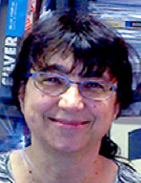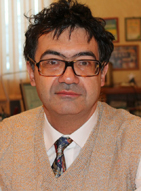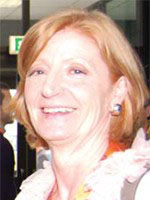Docenti 2016/17
 |
Giuseppe Anastasi è direttore del Laboratorio Nazionale Smart Cities & Communities del CINI (Consorzio Interuniversitario Nazionale per l’Informatica) e professore di Ingegneria Informatica presso il Dipartimento di Ingegneria dell’Informazione dell’Università di Pisa. In passato ha diretto il Master di II livello in Smart Cities presso l’Università di Pisa. Inoltre è membro del Consiglio Scientifico del Dipartimento di Ingegneria – ICT, Energia e Trasporti del CNR. I suoi interessi di ricerca attuali riguardano l’Internet of Things, con particolare riferimento alle sue applicazioni in ambito smart city. Ha curato la pubblicazione di due libri ed è autore di numerose pubblicazioni scientifiche in atti di conferenze e riviste internazionali. Sito web: http://www.iet.unipi.it/~anastasi Insegnamento: Networking   |
||||||||||
|---|---|---|---|---|---|---|---|---|---|---|---|
 |
Valerio Arnaboldi è un ricercatore presso l’Istituto di Informatica e Telematica (IIT) del Consiglio Nazionale delle Ricerche (CNR), all’interno del gruppo “Ubiquitous Internet” con sede a Pisa. Si occupa principalmente dell’analisi di strutture sociali all’interno di online social network, e della creazione di soluzioni applicative chiamate “Mobile Social Network” per scambio di dati basato su informazioni sociali e di contesto fra dispositivi mobili in prossimità tramite reti opportunistiche. Nel 2013 è stato studente di Dottorato in visita all’Università di Oxford, Regno Unito, nel gruppo di Ricerca “Social and Evolutionary Neuroscience Research Group”, sotto la supervisione del Prof. Robin I.M. Dunbar. Valerio ha conseguito una Laurea Triennale in Scienze e Tecnologie dell’Informazione presso l’Università dell’Insubria di Varese e Como nel 2007, una Laurea Magistrale in Tecnologie dell’Informazione e della Comunicazione presso l’Università degli Studi di Milano nel 2010 e un Dottorato in Ingegneria dell’Informazione presso l’Università di Pisa nel 2014. Prima di lavorare nel gruppo UI-IIT è stato assegnista di Ricerca presso il laboratorio di reti neurali dell’Università degli Studi di Milano. E’ parte del comitato tecnico della rivista internazionale “Computer Communications” di Elsevier. Inoltre, ha fatto parte del comitato organizzativo di diverse conferenze internazionali quali IEEE SustaInit 2012/13, IEEE SmartVehicles 2014/15, ACM MobiOpp 2012. Ha pubblicato diversi articoli di Ricerca su riviste e a conferenze internazionali. Insegnamento: Large scale network analysis   |
||||||||||
 |
Marco Avvenuti received the MS degree in Electrical Engineering (Ingegneria Elettronica) from the University of Pisa, Italy, and the PhD degree in Computer Engineering from the University of Padova, Italy. Currently, he serves as Associate Professor with the Dipartimento di Ingegneria dell’Informazione (DII) at the University of Pisa, Italy. In 1992 and 1996 he spent research stays at the International Computer Science Institute (ICSI) of Berkeley, CA. His scientific interests include sensor networks, pervasive healthcare, assistive and sport technology, human-centric sensing, environmental sensing. He has published more than 70 research papers in the area of distributed systems and mobile/pervasive computing. He is the founding co-director of the Pervasive Computing & Networking Laboratory (PerLab) and has contributed to several research programs funded by both national and european institutions. Marco supervised more than ten PhD students, served as PC member of IEEE FTDS, IEEE/IFIP EUC, IPC, PICom, FNC International Conferences. He launched the International Workshop on Adaptation in Wireless Sensor Networks (AWSN), co-located with IEEE ISPA-08 and IEEE/IFIP EUC-09, and the International Workshop on Sensor Networks for Intelligence Gathering and Monitoring (SNIGM), co-located with IEEE CCECE 2011, ANT 2012 and ANT 2013. He is a member of the IEEE Computer Society since 1995. Insegnamento: Web Technology   |
||||||||||
 |
Mario G.C.A. Cimino is with the Department of Information Engineering (University of Pisa) as a Researcher in Information Systems. He is also a research associate at the Institute for Informatics and Telematics (IIT) of the Italian National Research Agency (CNR). He teaches “Advanced Programming” and “Process-driven Information Systems”. His research focus lies in the areas of Swarm Intelligence and Business/Social Process Analysis, with particular emphasis on Stigmergic Computing and Workflow Mining and Simulation. He is (co-) author of more than 40 publications. He was a six-months visiting Ph.D. student at the Electrical and Computer Engineering Research Facility of the University of Alberta, Canada. He co-organized three editions of the Workshop on Computational Intelligence for Personalization in Web Content and Service Delivery. Insegnamento: Web Technology   |
||||||||||
 |
Gianpiero Costantino ha ottenuto la laurea triennale nel 2005 e specialistica nel 2007 presso l’Università degli Studi di Catania. Da novembre 2007 a marzo 2011 ha svolto il dottorato di ricerca presso l’Università di Catania e ha condotto i suoi studi su Trust, Collaboration e Power-Saving nelle reti mobili ad hoc (MANET). Da gennaio 2011 ad agosto 2015, è stato assegnista di ricerca nel gruppo di Sicurezza Informatica presso l’IIT-CNR. Da settembre 2015, ha assunto il ruolo di Ricercatore presso l’IIT-CNR e la sua ricerca coinvolge aspetti di sicurezza e privacy all’interno delle reti opportunistiche, Fog-computing, IoT, Cloud ed è coinvolto nei progetti Coco Cloud (FP7), HC@WORKS (EIT-Digital) e Securing Smart Airport (ENISA). Insegnamento: Lab of secure application development (network, mobile,cloud)   |
||||||||||
 |
Arianna Del Soldato è Tecnologo presso l’Istituto di Informatica e Telematica (IIT) del Consiglio Nazionale delle Ricerche (CNR), all’interno della sezione Servizi Internet e Sviluppo Tecnologico (SIST) e del Registro dei nomi a dominio sotto il ccTLD .it. All’interno del Registro .it, ha realizzato i sistemi software utilizzati dagli utenti e dai Registrar per la registrazione e il mantenimento in modalità asincrona dei nomi a dominio .it. Attualmente, inserita nell’Unità Relazioni Internazionali, rappresenta il Registro nei consessi dei meeting di ICANN, l’organizzazione internazionale no-profit responsabile della gestione e del coordinamento del sistema dei nomi a dominio. All’interno della sezione SIST si occupa principalmente di sistemi di gestione dei contenuti, siti e portali Web atti a facilitare e automatizzare i flussi di lavoro del personale. È responsabile dello Staff Tecnico del Team di Comunicazione dell’Area del CNR di Pisa per la realizzazione del nuovo sito Web dell’area della Ricerca. Svolge attività di docenza nell’ambito del Master “Internet Ecosystem: Governance e Diritti” del Dipartimento di Giurisprudenza di Pisa e, nell’ambito dei corsi di formazione organizzati dal Registro per i Registrar, in materia di Tecnologie Web. Nel 2013 ha frequentato il corso di perfezionamento “Computer forensics e investigazioni digitali” del Dipartimento di Scienze Giuridiche di Milano. Insegnamento: Digital forensics   |
||||||||||
 |
Gianluca Dini è Professore Ordinario presso il Dipartimento di Ingegneria dell’Informazione dell’Università di Pisa. I suoi principali interessi professionali riguardano la cybersecurity con particolare riferimento alle applicazioni nell’ambito dei Sistemi Informativi, dei Sistemi Industriali e di Controllo e dell’Internet of Things. È autore di 100+ articoli apparsi in riviste ed atti di congressi internazionali. È stato responsabile di numerosi progetti di ricerca nazionali, europei e finanziati da imprese. Insegnamento: Applied Cryptography and Access Control   |
||||||||||
 |
Abraham Gebrehiwot è dipendente a tempo indeterminato presso l’Istituto di Informatica e Telematica del CNR, e svolge il ruolo di responsabile del servizio “Rete telematica del CNR di Pisa”. Ha ottenuto certificazione industriale per l’insegnamento di corsi pratico-teorici (CCNP) presso l’Università di Central England atti a preparare insegnati esperti nella tecnologia, progettazione, realizzazione e gestione di reti LAN e WAN. Attualmente svolge il ruolo di responsabile di vari progetti di ricerca appartenenti al Dipartimento: Ingegneria, ICT e tecnologie per l’energia e i trasporti del CNR. Gli interessi di ricerca sono: gestione di reti Dual-Stack e sviluppo di strumenti di monitoraggio di reti IPv6. Insegnamento: Lab of Secure system configuration, device hardening and firewall management   |
||||||||||
 |
Filippo Maria Lauria è dipendente a tempo determinato presso l’Istituto di Informatica e Telematica del CNR e svolge il ruolo di tecnologo all’interno del gruppo “Rete telematica del CNR di Pisa”. Il suo principale interesse lavorativo è inerente alla sicurezza informatica nelle reti dual stack (IPv4/IPv6). Inoltre è attivamente impegnato nello sviluppo di network monitoring tool (6MoNPlus https://www.6monplus.it) Insegnamento:Lab of Secure system configuration, device hardening and firewall management   |
||||||||||
 |
Beatrice Lazzerini is Full Professor of Computer Engineering at the Department of Information Engineering, University of Pisa, Pisa, Italy, where she teaches “Intelligent Systems” and “Computational Intelligence”. From 2003 to 2010 she was President of the Master of Science in Computer Engineering for Enterprise Management of the University of Pisa. Her current research interests are in the field of Computational Intelligence, with particular emphasis on fuzzy systems, neural networks and evolutionary computation, and their applications to pattern classification, pattern recognition, risk analysis, risk management, diagnosis, forecasting, and multi-criteria decision making. She has coauthored seven books and has published over 220 papers in international journals and conferences. She is coeditor of two books. She was involved and had roles of responsibility in several national and international research projects, conferences, and scientific events. Insegnamento: Data mining   |
||||||||||
 |
Giuseppe Lettieri was born in Crotone, 6/6/1973. He received a PhD in Computer Engeneering on 14/3/2002. Since 3/1/2007 he is a full-time researcher at the “Dipartimento di Ingegneria dell’Informazione”. The scientific production of Giuseppe Lettieri has focused on computer architectures (single address space systems, application controlled memory management, high speed networking in real and virtualized systems) and applications of abstract interpretation to the problem of secure information flow and the verification of Java bytecode on embedded systems. Insegnamento: Operating Systems Security   |
||||||||||
 |
Francesco Marcelloni è professore ordinario presso il Dipartimento di Ingegneria dell’Informazione dell’Università di Pisa. I suoi principali interessi di ricerca sono relativi a classificatori fuzzy per big data, algoritmi evolutivi multi-obiettivo, sistemi fuzzy genetici, algoritmi di clustering fuzzy, pattern recognition, e compressione di dati in reti di sensori. Egli ha co-editato tre volumi e quattro numeri speciali di riviste internazionali, è (co-)autore di un libro e di più di 200 articoli apparsi in riviste e atti di congressi internazionali. Attualmente, serve come editor associato per le riviste Information Sciences e Soft Computing ed è membro dell’editorial board di altre riviste internazionali. Insegnamento: Data mining   |
||||||||||
 |
Fabio Martinelli is a senior researcher of Institute of Informatics and Telematics (IIT) of the Italian National Research Council (CNR). He is co-author of more than two hundreds of papers on international journals and conference/workshop proceedings. His main research interests involve security and privacy in distributed and mobile systems and foundations of security and trust. Since 2004 He is in the board of directors of the international school on Foundations of Security Analysis and Design (FOSAD). He founded and chaired the WG on Security and Trust management (STM) of the European Research Consortium in Informatics and Mathematics (ERCIM). He is currently chair of the WG 11.14 in secure engineering of the International Federation of Information Processing (IFIP). He usually manages R&D projects on information and communication security and in particular He is currently the Project Coordinator of the EU Network on Cyber Security (NeCS). He is the co-chair of the Italian technological platform in homeland security (SERIT) and chairs the WG3 on Research and Innovation of the Network and Information Security (NIS) Platform promoted by the European Commission. He also serves as expert in the H2020 Protection and Security Advisory Committee (PASAG) and acts as First Director in the Board of the European Cyber Security Organization (ECSO). Insegnamento: Mobile and cloud security; Lab of secure application development (network, mobile,cloud)   |
||||||||||
 |
Maurizio Martinelli is a senior Technologist of Institute of Informatics and Telematics of the Italian National Research Council (IIT-CNR). He is head of the “Internet Services and Technological Development” group of IIT-CNR, formed by several laboratories and about 15 people, whose main task is the planning, designing and developing of innovative telematics applications for the IIT and, more in general, for the CNR, the Italian Public Administration and the private sector. He is also the Chief Technical Officer of the .it Registry and head of the “Systems, Development and R&D” Unit of the .it Registry, formed by about 16 people, and whose main task is the design and the implementation of advanced technologies for the management of new generation domain names Registries, and the development and management of the technical infrastructure of the .it Registry. His main technical competences are in the field of DNS and DNSSEC, CMS and Web technologies, data flow management and electronic filing systems, network and services monitoring applications and databases. He is co-author of about 150 publications. Insegnamento: Digital forensics; Lab of cyber security and risk monitoring for networks and applications   |
||||||||||
 |
Paolo Mori (M.Sc. 1998, Ph.D. 2003) is a researcher at “Istituto di Informatica e Telematica” of “Consiglio Nazionale delle Ricerche” of Italy. His main research interests involve trust, security and privacy in distributed systems, focusing on access/usage control and trust and reputation management in distributed environments and for mobile devices. He usually serves in the Organization and Program Committees of international conference/workshops. He is (co-)author of several papers published on international journals and conference/workshop proceedings. He is usually actively involved in research projects on information and communication security, such as the European Commission funded “Confidential and Compliant Clouds” (CoCoCloud). Insegnamento: Mobile and cloud security; Lab of secure application development (network, mobile,cloud)   |
||||||||||
 |
Michele Pagano ha preso servizio come Ricercatore nel 1997 e dal 2007 è professore associato (confermato nel 2010) presso il Dipartimento di Ingegneria dell’Informazione dell’università di Pisa. Attualmente è titolare dei corsi di Telematica, Prestazioni di Reti Multimediali, Sicurezza nelle Reti e Architetture, Componenti e Servizi di Rete; inoltre ha tenuto cicli di lezioni presso prestigiose università in Russia e Polonia. I suoi interessi di ricerca sono rivolti alla caratterizzazione statistica e alla classificazione del traffico, alle prestazioni di rete, alla sicurezza di rete (con particolare riferimento a tecniche di anomaly detection), a Green Networking e a Software Defined Networking. E` co-autore di oltre 200 articoli scientifici, su riviste e a conferenze internazionali. Insegnamento: Network security & Ethical hacking   |
||||||||||
 |
Andrea Passarella è ricercatore presso l’Istituto di Informatica e Telematica del CNR. Si occupa di reti mobili e di Online e Mobile Social Networks, con enfasi sullo studio delle strutture sociali umane in Online Social Networks tramite l’analisi di dati su interazione tra utenti. È co-autore di più di 120 pubblicazioni su riviste e congressi internazionali, ed ha ricevuto diversi riconoscimenti, tra cui 4 Best Paper Awards a congressi internazionali. È stato ed è tuttora coordinatore di gruppi di ricerca CNR in progetti finanziati dalla Commissione Europea. È membro del comitato editoriale di riviste internazionali del settore, e svolge abitualmente ruoli organizzativi nell’ambito di congressi internazionali di riferimento nell’area delle reti mobili. Insegnamento: Large scale network analysis   |
||||||||||
 |
Rita Rossi è responsabile dal 1998 dell’Unità Aspetti legali e contrattuali del Registro .it. In tale veste si è occupata della redazione della disciplina contenuta nel Regolamento di assegnazione e gestione dei nomi a dominio, nel regolamento per la Risoluzione delle dispute nel ccTLD .it, nonché della predisposizione di appositi accordi contrattuali con i Registrar, organizzazioni accreditate dal Registro.it. Dal 2004 è membro della Commissione Regole del Registro .it , oggi Comitato Consultivo di Indirizzo del Registro .it, organismo che persegue la finalità del miglior funzionamento del servizio inerente la registrazione dei nomi a dominio in Internet di spettanza del Registro .it, mantenendo corretti rapporti con tutti gli stakeholders pubblici e privati. E’ membro del Legal and Regulatory Working Group del Council of European National Top-Level Domains Registries, in acronimo CENTR, l’associazione dei Registri Europei dei ccTLD. Ha svolto attività di docenza nell’ambito di incarichi di insegnamento ricevuti dall’Università di Pisa, dall’Università di Padova e ha partecipato, come relatrice, a numerosi convegni e conferenze organizzate da ordini professionali forensi e da altri Enti pubblici e privati di rilevanza nazionale. Insegnamento: Legal aspects of cybersecurity   |
||||||||||
 |
Maurizio Tesconi è un ricercatore dell’Istituto di Informatica e Telematica del CNR di Pisa. Laureato in Ingegneria Informatica, ha ottenuto un dottorato di Ricerca in Ingegneria dell’Informazione con una tesi riguardante lo sviluppo di un framework per la gestione di risorse semantiche complesse. I suoi interessi di ricerca includono il web mining, la social network analysis e visual nalytics nell’ambito dell’Open Source Intelligence. Attualmente è il responsabile scientifico lato CNR del Centro di Ricerca per l ‘Analisi delle Informazioni Multimediali (CRAIM), in cui esperti della Polizia di Stato e ricercatori del C.N.R., opereranno in sinergia con il fine di svolgere attività di ricerca e supporto operativo nel settore delle analisi dei dati per la Polizia di Stato. Insegnamento: Cyber intelligence   |
